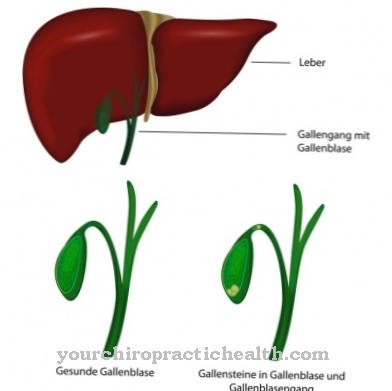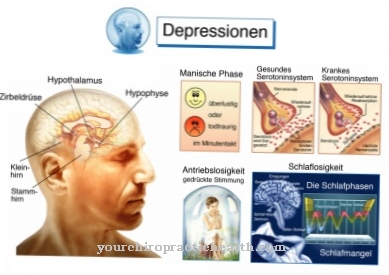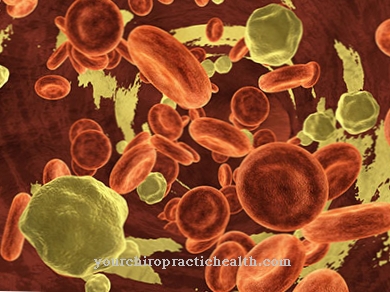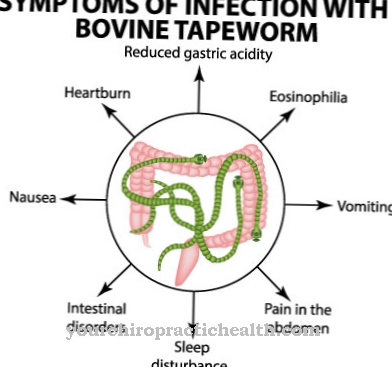schizophrenia is a mental illness that completely affects the person's personality. Often those affected have a disturbed relationship to reality, which manifests itself, for example, through delusions and hallucinations. Schizophrenia usually occurs for the first time in the years between puberty and a maximum of 35 years.
What is schizophrenia?

© Hans-Joerg Hellwig - stock.adobe.com
schizophrenia is a mental disorder that affects all of the patient's perceptions. Both internal and external perception change, in some cases considerably. This affects the patient's emotional life and thinking. The drive and motor skills also change.
Schizophrenia usually comes on in flares. A bout of illness is also called psychosis. In doing so, those affected can completely lose touch with reality. Psychiatry differentiates between different forms of schizophrenia depending on the symptoms. In paranoid-hallucinatory schizophrenia, hallucinations and delusions occur.
Catatonic schizophrenia is characterized by symptoms in the motor skills. If the emotional life is mainly disturbed, it is a hebephrenic schizophrenia. In the case of a lack of drive, social withdrawal and a lack of emotion, one speaks of residual schizophrenia.
causes
Probably one of the causes schizophrenia various factors play a role. It is believed that a genetic predisposition is the central factor. However, other factors must also be added as triggers. This can be, for example, stress, drug use or even drastic events in life.
Psychosocial factors could also be a cause of schizophrenia. However, it has not yet been scientifically proven that problems in the family, partnership or work are the cause of the outbreak of schizophrenia. Biochemical causes have not yet been conclusively proven scientifically. However, it has been shown that the docking sites for dopamine in a schizophrenic's brain are hypersensitive. Dopamine is a messenger substance that transmits nerve impulses.
Neuroanatomical causes are also suspected to be the cause of schizophrenia. It was found that some patients have an enlarged chamber in the brain filled with cerebrospinal fluid. In addition, the cerebral blood flow is changed in the presence of schizophrenia.
Symptoms, ailments & signs
A striking symptom of schizophrenia is delusion. The sick suffer from absurd delusions that have no real basis. Even so, these ideas seem realistic to people with schizophrenia, so that even logical reasoning cannot change their mind. An example of a delusion is paranoia.
Those affected think that they are being persecuted and threatened. In a relationship delusion, on the other hand, they relate all possible events to their person. Thinking changes significantly in the course of the disease. The trains of thought suddenly break off and / or are disorganized. Another symptom of schizophrenia is ego disorder.
The boundary between oneself and the outside world is blurred, parts of one's own body or thoughts are perceived as foreign. Likewise, people with schizophrenia often have hallucinations. These usually manifest themselves in an acoustic form and are perceived by the patients as extremely threatening.
People with schizophrenia are often listless, powerless, or [apathetic]]. They have little interest in social contacts or leisure activities. The emotions are flattened, those affected are irritable, suspicious or depressed. Not all signs of schizophrenia are always equally present. They vary both in the course of the disease and from patient to patient.
Course of disease
The course of the disease schizophrenia is different for each person affected. Many sufferers begin to show the first signs months or even years before the actual onset of schizophrenia. However, these first signs do not yet clearly point to schizophrenia.
For example, those affected keep their distance and withdraw. They are often depressed and have a distorted perception of reality. This preliminary stage of schizophrenia is called the prodromal phase. If schizophrenia breaks out acutely, hallucinations, delusions (e.g. paranoia) and ego disorders occur.
In addition, there are thought disorders, lack of emotions and lack of drive. However, the severity and combination of symptoms are different for each patient. An acute phase can last from a few weeks to a few months. Then it subsides again. The course of schizophrenia can progress in stages. It can happen that after each new outbreak, some of the symptoms persist for a long time. This is called the chronification of schizophrenia.
Complications
One possible complication of schizophrenia is worsening of symptoms. This is the case for around a third of those affected, while another third experiences an improvement or no significant change Many schizophrenics suffer from a chronic physical illness.
Neuroleptics or antipsychotics are drugs that can be used in schizophrenia. These psychiatric drugs can also cause complications. Some active substances from the group of atypical antipsychotics seem to increase the risk of diabetes mellitus. Other neuroleptics make the person more likely to develop Parkinson’s disease.
A parkinsonoid is a drug-induced Parkinson’s syndrome that is similar to neurodegenerative disease. However, the symptoms are not due to a decrease in the substantia nigra, as is the case with Parkinson's, but to the use of a drug. Other potential side effects of antipsychotics include seizures, movement disorders, and / or weight gain.
A serious but rare complication of neuroleptics is neuroleptic malignant syndrome, which occurs in 0.2 percent of people who take antipsychotics. Typical symptoms include fever, rigidity, and decreased consciousness. Neuroleptic malignant syndrome is life threatening and must therefore be treated. In each individual case, the attending physician will weigh up whether the benefits or risks of a drug outweigh the risks for a particular patient.
Complications are also possible on a psychological level. Every second schizophrenic suffers from another mental illness. The most common comorbidities are anxiety disorders, mood disorders and disorders caused by psychotropic substances.
When should you go to the doctor?
The consultation of a doctor is indicated as soon as an abnormal behavior of the person concerned shows, which is described as above the norm. Hallucinations, seeing and perceiving imaginary beings, or prompting for action are worrying. Clarification by a doctor is necessary as soon as voices are heard, an aggressive demeanor or danger to the person concerned and people in the immediate vicinity.
If social rules are not adhered to, if relatives are emotionally injured or if parts of your own body are perceived as foreign, a doctor's visit is necessary. Many patients justify their actions by believing that their thoughts have been conveyed to and controlled by an outside source. Schizophrenia is to be distinguished from religious or spiritual inspirations without any disease value.
If everyday life cannot be dealt with without help, if the person concerned changes their personalities or if their behavior triggers fear in others, action is required. A doctor is needed because patients with schizophrenia require drug therapy. Withdrawal from social life, isolation or a strong distrust of all people are characteristic of the disease and should be monitored by a doctor. Medical help is also required in the event of depressive behavior.
Treatment and therapy
As for the creation of a schizophrenia Many different factors can be responsible, multidimensional therapy is used in the treatment. It consists of treating the patient with psychotropic drugs, psychotherapy and sociotherapy. In the field of psychotherapy, supportive psychotherapy is sometimes used.
This therapy gives those affected support in dealing with their illness. In addition, all methods of behavior therapy are used. The therapy is always based on the patient's individual clinical picture. Sociotherapy supports the person affected in all skills that are important for everyday life. Sociotherapies can be occupational or occupational therapies, for example.
But rehabilitation offers may also be part of sociotherapy. Treatment for schizophrenia usually begins with inpatient treatment at a clinic. Thereafter, the treatment takes place in a day clinic. Most of the time, the patient then changes to a therapeutically supported shared apartment, in which he can lead an independent life despite schizophrenia.
You can find your medication here
➔ Medicines to calm down and strengthen nervesprevention
Since with one schizophrenia Hereditary factors play a major role, general prevention against the disease is not possible. However, if there is a hereditary predisposition, it is advisable to avoid any stress and to refrain from drug use, as these factors can promote an outbreak of schizophrenia.
Aftercare
Because schizophrenia is serious mental illness, aftercare is often difficult for those affected.Therapy to treat the disease is a lengthy process, the duration of which is often not foreseeable. After initial therapy, further psychiatric care and support is recommended to patients. This is intended to reduce and contain the occurrence of possible consequences.
A complete cure of the disease is rarely possible. Those affected must therefore constantly work on their well-being. The aftercare For this reason, it primarily affects the environment of the sick. Friends, Family members and significant other should therefore work closely with the therapist and doctors work together to provide those affected with active support with aftercare.
Most of the sick people have an active personal follow-up care the complex clinical picture is not possible. The ongoing effects make the possibility of inspection almost impossible. Filtering out bad behavioral habits is an almost impossible task for the sick.
Those affected can hardly cope with positive changes and measures alone, which is why the aforementioned support for the environment is of massive importance. In addition, in most cases further medical treatment in the form of medication cannot be dispensed with. Therapeutic measures can immensely increase the well-being of those affected and prevent complaints.
You can do that yourself
Many people affected and their relatives experience schizophrenia as a disease that can only be influenced by medication. Although drugs play an important role in therapy, self-help is another important component. To facilitate treatment and minimize restrictions, it is important to detect recurrence of symptoms as early as possible. An important part of self-help is therefore to become aware of your own schizophrenia symptoms and to consult a doctor or therapist if they recur. Relatives can also support schizophrenic people in this task.
Critical life events and a high level of stress can cause or intensify psychotic symptoms again. However, not all schizophrenics respond negatively to stress - personal experience can help assess and prepare for future responses to stress at work or family conflicts.
If a patient's psychotic symptoms are aggravated by stress, general stress-reducing measures can be helpful in everyday life. It should be noted, however, that relaxation methods such as autogenic training and progressive muscle relaxation, which are otherwise popular, are not recommended for psychotic symptoms. Instead it can be useful, e.g. B. to plan enough breaks in everyday life and to ask for help in good time if there are problems.






.jpg)

















.jpg)



